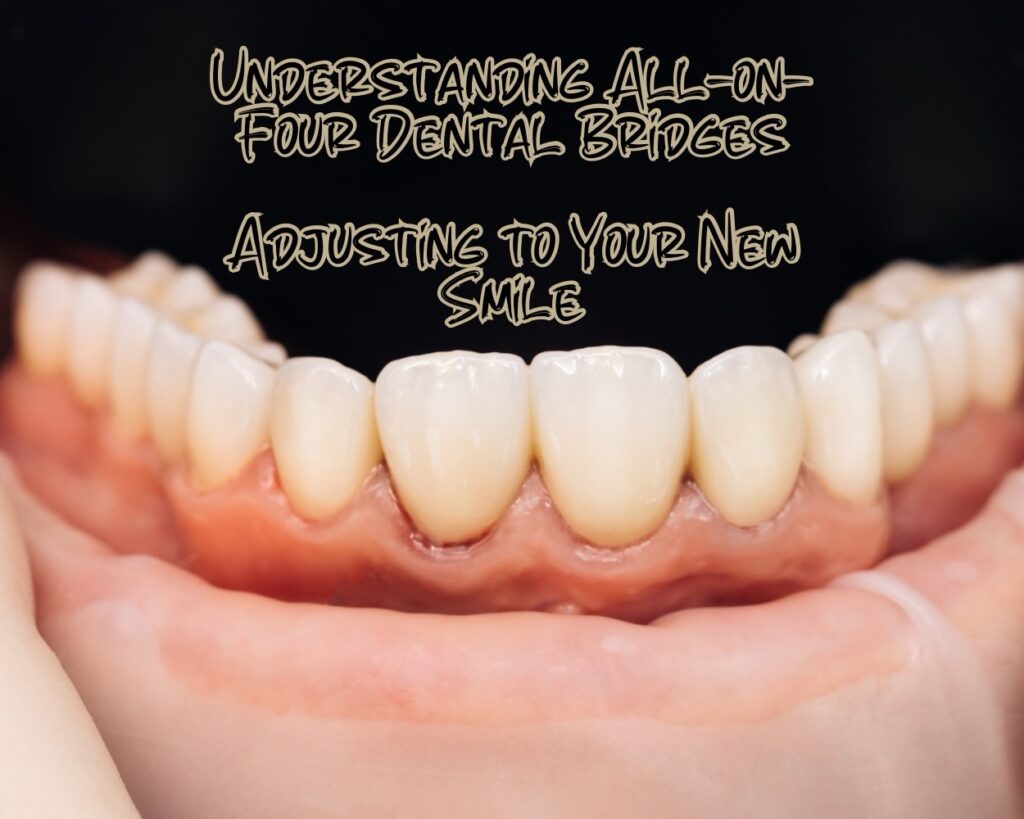The All-on-Four dental bridge is a revolutionary solution for individuals seeking a full-arch restoration. This procedure involves anchoring a dental prosthesis to the jaw using four strategically placed implants. While it’s a highly effective treatment, adjusting to your new teeth can come with questions and concerns, especially if they feel a bit loose initially. Let’s explore why this happens and what you can expect as you adapt to your new dental bridge.
The All-on-Four Dental Bridge: An Overview
A Modern Solution for Tooth Replacement
- Procedure: The All-on-Four technique involves placing four dental implants in the jawbone, which serve as anchors for a full dental bridge. This method is often recommended for patients with significant tooth loss or decay.
- Benefits: This procedure offers a stable, long-lasting solution that closely mimics natural teeth, both in function and appearance.

Experiencing Looseness in New Dental Bridges
Is It Normal?
- Initial Adjustment: It’s not uncommon for new All-on-Four dental bridges to feel slightly loose. This can be due to the healing process, as your mouth adjusts to the implants and the prosthesis.
- Dental Intervention: Dentists use specialized tools to adjust and secure the dental bridge to the implants. This process ensures that the bridge is properly anchored and can withstand the pressures of daily use.
Why Do New Dental Bridges Feel Loose?
Understanding the Healing Process
- Osseointegration: This is the process where the jawbone grows around the implants, securing them in place. It can take several months for complete osseointegration, during which slight movement of the bridge may be noticeable.
- Gum and Bone Adjustment: Your gums and bone structure are also adapting to the new implants and bridge, which can contribute to the sensation of looseness.
Habitual Chewing and Getting Used to New Teeth
Adjusting to the Feel of All-on-Four Bridges
- Chewing Habits: It’s natural to feel conscious of your new dental bridge and to habitually chew or clench your teeth. Over time, as you get used to the bridge, these habits should diminish.
- Adaptation Period: Most patients go through an adaptation period where they become accustomed to the feel of their new teeth. Patience and regular follow-ups with your dentist are key during this phase.

Ensuring the Longevity of Your Dental Bridge
Tips for Care and Maintenance
- Regular Check-Ups: Visit your dentist regularly to ensure that your dental bridge is functioning correctly and to make any necessary adjustments.
- Oral Hygiene: Maintaining good oral hygiene is crucial for the longevity of your All-on-Four bridge. Brushing, flossing, and using recommended mouthwashes can help keep your new teeth and gums healthy.
How Much Does an All-on-Four Dental Bridge Typically Cost?
Answer: The cost of an All-on-Four dental bridge can vary widely depending on several factors, including the complexity of the case, the materials used for the bridge, the geographical location, and the dentist’s expertise. On average, the price can range from $20,000 to $50,000 or more for a full-mouth restoration, which includes tooth extraction, implant placement, and the zirconia bridges. It’s a significant investment, but for many, the transformative results in terms of function and appearance are well worth the cost.
Are All-on-Four Dental Bridges Covered by Insurance?
Answer: Dental insurance coverage for All-on-Four procedures varies. Some insurance plans may cover a portion of the cost, particularly if the procedure is deemed medically necessary. However, many insurance plans consider this procedure to be cosmetic and may not offer coverage. It’s important to check with your insurance provider and discuss payment options with your dental office.
How Long Do All-on-Four Dental Bridges Last?
Answer: All-on-Four dental bridges are designed to be a long-lasting solution. With proper care and maintenance, they can last many years, often over 20 years. The longevity of the bridge depends on factors like oral hygiene, lifestyle habits, and regular dental check-ups.
Can I Eat Normally with All-on-Four Dental Bridges?
Answer: Yes, one of the significant advantages of All-on-Four dental bridges is the ability to eat a wide range of foods comfortably. Initially, your dentist might recommend a soft diet as you adjust to your new teeth. Once fully adapted and healed, most patients can enjoy their favorite foods with few restrictions.
What Is the Success Rate of All-on-Four Dental Bridges?
Answer: The All-on-Four procedure has a high success rate, typically above 95%. The key to success includes proper patient selection, skilled surgical execution, and diligent post-operative care. Regular dental visits are crucial for monitoring the health of the implants and the surrounding tissues.
How Do I Care for My All-on-Four Dental Bridges?
Answer: Caring for your All-on-Four dental bridges involves regular brushing and flossing, just like natural teeth. Special attention should be given to cleaning around the implant sites. Additionally, regular dental check-ups and cleanings are essential to maintain the health of your gums and the integrity of the implants.
All-on-Four dental bridges represent a significant advancement in dental restoration, offering a durable and functional solution for those with extensive tooth loss. While the initial cost can be high, the investment in your oral health and quality of life can be invaluable. Proper care and regular dental visits are key to ensuring the longevity and success of your All-on-Four dental bridges.
While feeling a bit of looseness in your new All-on-Four dental bridge can be concerning, it’s often a normal part of the adjustment and healing process. It’s important to maintain open communication with your dentist and attend all follow-up appointments to ensure that your dental bridge is secure and comfortable. With time and proper care, you’ll likely find yourself adjusting well to your new teeth, enjoying the benefits of a restored smile.
As you adjust to your new All-on-Four dental bridges, it’s natural to have more questions, especially regarding their maintenance, lifestyle adjustments, and overall oral health. To further support your journey, here are some relevant articles from HealthSurvivalist.com that can provide additional insights:
Managing Chronic Pain: A Struggle Beyond Words
While not directly related to dental procedures, understanding chronic pain management can be beneficial, especially if you’re experiencing discomfort post-surgery. This article, “Living with Chronic Pain: A Struggle Beyond Words”, offers insights into coping strategies and maintaining quality of life despite persistent pain.
Understanding Pain and Its Mechanisms
Persistent neck pain, though different in origin, can share similarities with post-dental procedure discomfort. The article “Persistent Neck Pain and Associated Symptoms – Dizziness & Burning Pain” delves into understanding such pain and its associated symptoms, which might be useful in comprehending your body’s response to dental treatments.
The Role of Medications in Managing Pain
If you’re considering medication for pain management after your dental procedure, the article “Flonase: Understanding Its Uses, Mechanism, and Generic Alternatives” can provide a broader understanding of how certain medications work, their uses, and alternatives.
Common Questions About All-on-Four Dental Bridges
How Do I Maintain Oral Hygiene with All-on-Four Bridges?
Answer: Maintaining oral hygiene with All-on-Four bridges involves regular brushing and flossing, just like natural teeth. Special brushes and floss designed for dental implants can be used to clean around the implant sites effectively.
Can All-on-Four Bridges Affect My Speech?
Answer: Initially, you might notice slight changes in your speech. However, as you get used to your new bridges, any speech impediments typically improve. Practicing speaking and reading aloud can expedite this adjustment process.
Is It Normal to Feel Sensitivity with New Dental Bridges?
Answer: Some sensitivity is normal as your mouth adjusts to the new bridges. If sensitivity persists or is severe, it’s important to consult with your dentist to ensure everything is healing properly.
As an Amazon Associate we earn from qualifying purchases through some links in our articles.




